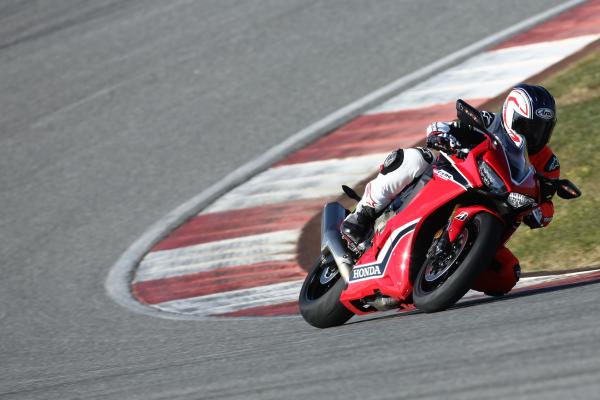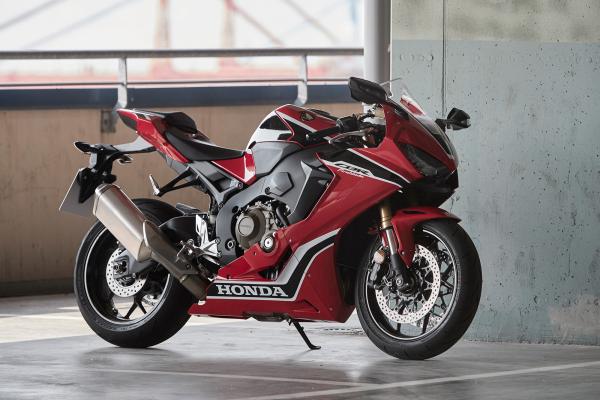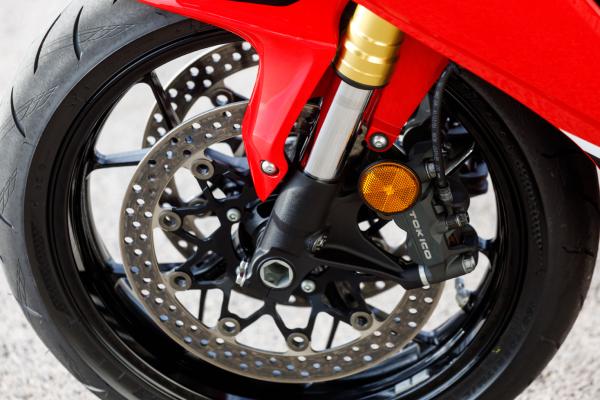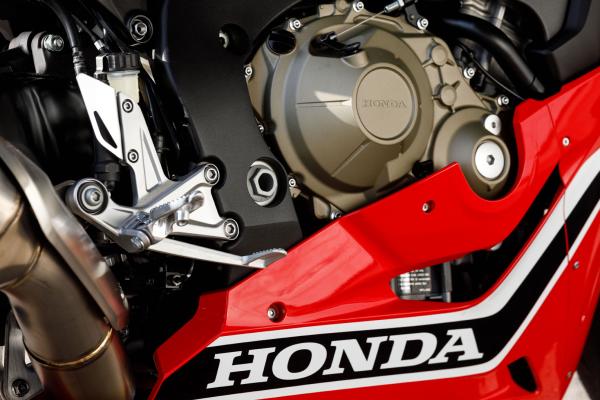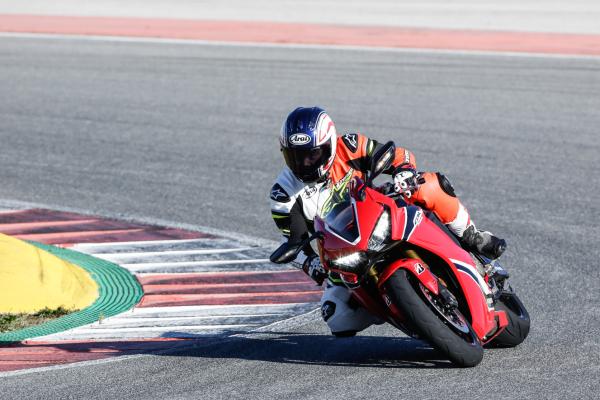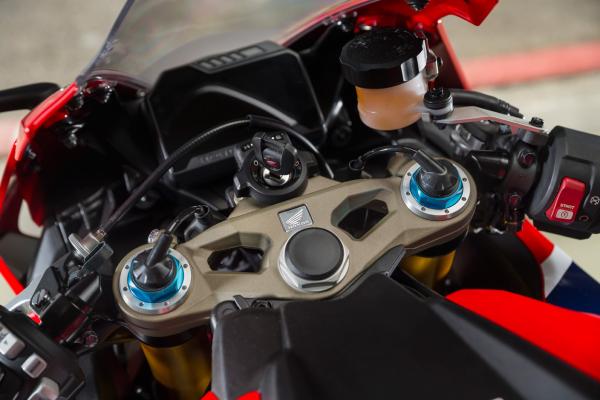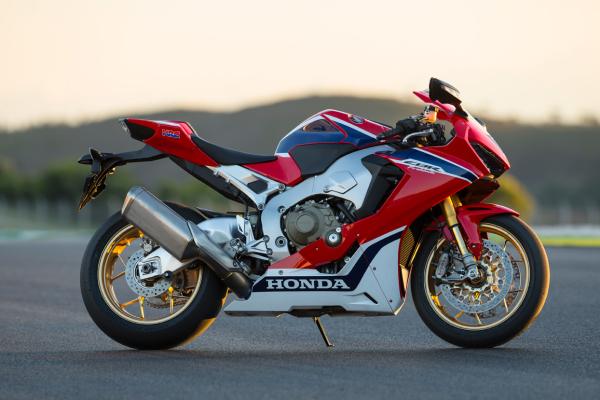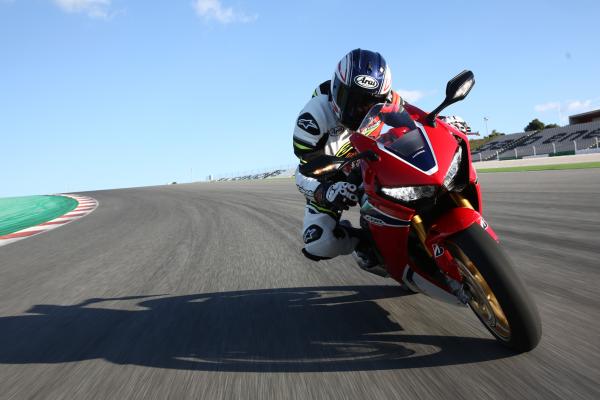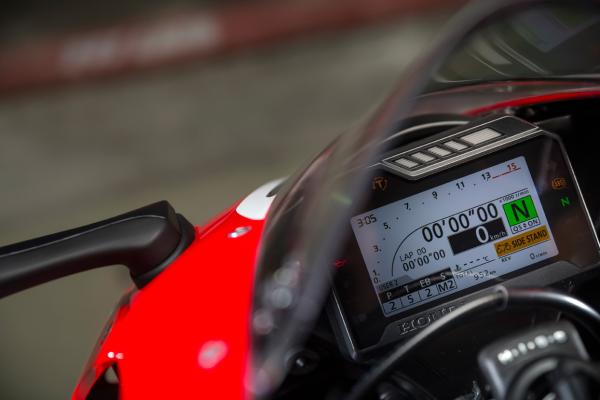2017 CBR1000RR Fireblade/SP review: First ride
It's lighter, more powerful and packed with technology but is the new 2017 CBR1000RR Fireblade/SP back in the fight for litre-bike supremacy?

Member for
54 years 8 monthsFOR 2017, Honda has given the legendary Fireblade its first proper update in nearly a decade. It’s dropped a load of mass, added a stack of grunt, and baked in a full-beans ride-by-wire engine management system with IMU oversight of ABS and electronic suspension too (on the flash SP version). Phew. Will the 2017 CBR1000RR Fireblade/SP be enough to put the big H back into the serious litre bike fight it's been missing from lately?
The last time I was heading out on a new Fireblade launch, America was about to vote for a very new, very different president. Back in 2008, Barack Obama was heading to 1600 Pennsylvania Avenue as the first black POTUS and I was heading to Losail circuit in Qatar to have a spin on the heavily-updated 2008 Fireblade CBR1000RR.
Two presidential terms later, Obama's been replaced by a new model. It's loud, brash, powerful – but the handling seems like it might be a wee bit suspect… Donald Trump was taking his oath of office as we arrived at Portimao circuit for the launch of the 2017 Honda Fireblade. And while this new bike also looks to be very different from the previous incumbent, it all looks very good, on paper at least.
Next morning dawned bright and early, and although there was a tiny nip in the air, there wasn't a cloud in the sky. The sun was shining hard on the Portimao tarmac already, and as I changed into riding gear for the first session, confidence was high. A line of standard RRs was parked up on paddock stands, tyre warmers cooking the stock Bridgestone S21 tyres – and there was a host of Honda stars waiting to help out folk like me who were at the track for the first time. Fast Freddie Spencer was assigned for this sighting session – who better than a genuine GP legend to take us through the perplexities of Portimao?
The Portuguese track is a challenge in every way. It's very long – over 4.5km – and very fast, with loads of elevation changes, a few blind bends, and a savage mix of corners.
But I started to feel at home straight away – and much sooner than I'd hoped for. Freddie was the perfect instructor, and the Fireblade was just the friendly helping hand you need when you're learning a new circuit.
The stock bike has conventional suspension and Tokico brakes – and all the launch machines had the optional quickshifter fitted. The Bridgestones felt grippy and communicative, the suspension supple and controlled, the brakes strong and as the pace picked up, I began to settle into the new Blade experience.
I was left to my own devices for the second session, so after a fast blat out of pit lane, I was into the groove. At the end of the straight lies a pair of bends that lead into the first slow bend, a second-gear uphill right-hander, followed by the first blind entry, onto a short straight and as I clicked up through third to fourth, the excellent quickshifter snicked away like a robotic arm on a Japanese assembly line.
Then it’s back down to second for a left-hander, and up and over another rise, downhill into a faster right, then back uphill again before you take off from a big old drop, a little like Paddock Hill, only straight (ish). My brain was fried trying to take it all in – and that’s only half the lap…
… but the Blade is like an old pal egging me on round a massive pub crawl. The engine feels strong, lusty, but not monstrous in the way that a less-refined litre bike can do. And it definitely made me feel in control: the new ride-by-wire throttle has no surprises, and always delivered what I wanted round Portimao.
The quickshifter is exactly as you'd expect from the big H – it works extremely well, particularly on downshifts. Only a big firm like Honda has the resources to spend the thousands of man-hours needed to perfectly map a quickshifter function into an ECU and it shows here.
The ABS and traction control electronics are there in the background of course, keeping a careful eye on things – but they might not save you from absolutely everything. When pushing on a bit, I had a slight moment on the bumpy section coming out of the turn four - the back wheel stepped out and I was out of the seat. It was more down to the road tyres getting a bit hot and bothered than anything else, but was a gentle reminder to watch my step.
The stock bike has the same ABS and engine management electronics as the SP – with the SP getting the Öhlins electronic suspension system. I was on the factory-recommended 'Track' mode for the early sessions, which gives full power (from five options) and the traction control is on '2' (from nine options, plus off).
It’s a good balance – on the last bend, a super-scary fast right hander onto the straight, I noticed the wee yellow light flashing a couple of times, which is weirdly reassuring. On the other hand, just a couple of hundred yards down the straight, there's a bit of a rise, and if you catch it right (or wrong…) the front end comes up, and the traction control cuts savagely, dropping back down and bouncing your genitals into the fuel tank. Ouch.
For session three, we raise the stakes. The Honda techs wheel out the fleet of HRC-logoed SP bikes, with Bridgestone V02 slicks spooned onto the gold-painted rims. There are no SP2s here – they hit production in March – so no Marchesini wheels sadly. But the 'normal' SP looks very proper indeed with the V02s on there.
The other big change is the suspension. The Showa kit on the RR felt perfectly fine early doors – but there were a couple of times where I felt that the wheel control was wanting just a little. Some setup time would sort that, but with the limited time available, I didn’t have the opportunity. But once on the SP, the Öhlins-kitted SP immediately feels more planted and slicker, with more refined suspension action.
I’m on the manual 'Track' mode of the electronic control unit first, rather than the automatic 'semi-active' mode. While the range of adjustment is a little bewildering to try and take in with the time I have available, the result is clear: I’m able to get on the power sooner, brake later, and generally behave as if there's some sort of devilish magic carpet under me, rather than a two-wheeled velocipede…
I'm about to get an even bigger riding aid though.
John McGuinness thunders past me like a de-limited Spanish HGV passing when you're changing a tyre on the hard shoulder. He looks back, cuts his speed by about 100mph and suddenly I've got the ultimate Playstation ghost vehicle to follow. For the next couple of laps, I get a huge boost through two or three of the trickiest corners, holding a line out longer, turning in later, and generally clicking up a level in competence and confidence. A thumbs-up from Morecambe's wisest bike rider and we come in for lunch and a much-needed break.
The last session of the day is a mammoth 45-minute one and the bikes are on the Öhlins automatic settings. Here, the suspension control unit is working in a semi-active mode, using the info from the Bosch IMU box, plus speed, throttle, brake and gear info over the CANBUS network to alter damping on the fly.
I'm getting tired though – particularly from hanging on down the enormous 170mph-odd main straight. The Blade designers were very keen to point out how small the front fairing is – and they're right, it’s more like a 600 than the old fatter 1000. The downside of that is the windblast when you're not totally tucked in. I had a camera mounted to the top of the tank, so couldn’t get down behind the screen as much as I needed and whenever I hit the main straight, my neck muscles burned with the effort on every lap. John McGuinness was already making plans for some sort of barn-door screen upgrade for the TT – he reckoned that two hours of high-speed antics on the Island would be a real drag (!) with the new, standard, smaller fairing. The new screen is quite low though, even for me. If you’re taller you’ll I think you'll want a different screen for long distance work.”
In terms of ergonomic comfort, the one problem about only riding a new bike on track at a launch is that it’s harder to assess things like riding comfort on motorway runs and the like. Having said that, the new Blade felt fine for me in terms of leg room and seat-peg-bars relationship. I’m sort of average-short height (5ft 8in), but with short legs.
I’m still having a ball though. I've just about got my mind around the track, and while I'm still a long way off getting it anywhere near 'right', I'm much more confident about keeping it pinned on the blind sections. I get a little bit of time to take in more of my surroundings – the gorgeous, easy-to-use colour TFT dashboard, the classy top yoke, the new switchgear. It’s all top-notch stuff, although they've swapped the horn and indicator switches round, so I end up beeping my intentions to turn into the pit lane at the end of each session. You’ll adapt quite quickly, but if you ride different bikes like I do, then it’s a pain - and arguably a bit dangerous. If you need the horn in a hurry, hit the indicators instead, you might end up in trouble. Mirrors are good - I could easily see the BSB and GP heroes coming up from behind at high speed…
And things like the TFT dash, quickshifter and build quality need to be top-notch because the new Fireblade is not cheap - the stock bike is a sniff over £15k, and there's not much change from £20k for the SP. A fair chunk of that is down to the Brexit-induced weakness of the pound of course, and part of it is no doubt a (fairly justified) cashing-in by Honda on a very impressive, high-spec new bike.
Should you buy the 2017 CBR1000RR Fireblade/SP?
Is the new Fireblade better better than the old one? Definitely. You can feel there’s more grunt all round and the electronics are really well executed - albeit with a few restrictions that really advanced riders might want. If you want the system like Aprilia’s, say, the Honda might be a bit of a walled garden for you. Think Apple rather than Android.
The SP is quite a bit pricier - I don’t think you’d hate yourself every day if you had to save the £4k. Unlike something like a Multistrada or R1200GS, I don’t think the missing stuff on the standard bike is a deal breaker. You could fit an Ohlins shock, perhaps some used Brembo calipers, and be fairly close to the SP most of the time. It’s not like the SP has titanium rods, or bigger throttle bodies or the like - the engine is the same. Buy a stock bike, spend £1.5k on modding it over time, and I imagine you’ll be 90% as happy as if you’d bought the SP.
Is it worth it? Only you can answer that for yourself of course. But while the raw performance of the Honda might be topped a little here or there by some of the competitor machines, I reckon the Blade's blend of high-tech, Honda quality and reliability, plus the massive leap in performance over the old bike, could well make it worth every penny.
2017 CBR1000RR Fireblade/SP specs
- Model tested: 2017 Honda CBR1000RR Fireblade and CBR1000RR Fireblade SP
- Price: £15,225 (RR), £19,125 (SP), both otr
- Specifications [SP version]
- Engine: 16v inline-four, DOHC, liquid cooled, 999cc
- Bore x stroke: 76x55mm
- Compression ratio: 13:1
- Max power (claimed): 191hp@13,000rpm
- Max torque (claimed): 86ft lb@11,000rpm
- Transmission: six speed, slipper clutch, chain
- Frame: cast aluminium diamond-type
- Front suspension: 43mm fully-adjustable Showa Big Piston USD forks [Ohlins SEC electronic NIX30 fork]
- Rear suspension: fully adjustable balance-free Showa shock [Ohlins SEC electronic TTX36 shock]
- Brakes: Nissin four-piston calipers, 320mm<?> discs (front), ? disc rear [Brembo M4 front calipers]
- Wheels/tyres: five spoke cast alloy/Bridgestone S21, 120/70 17 front, 190/50 17 rear
- Rake/trail: 23.3°/96mm
- Wheelbase: 1405mm
- Kerb weight: 196kg [a95]
- Fuel capacity: 16 litres
- Colours: red/black, black (RR), HRC red/white/blue (SP)
